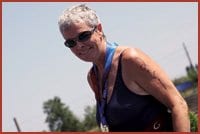
BEST. Reta Currie of Kanata won gold in women's sprint age 60-64. Credit: Pat Croteau
A series of moments stay with you after the Outgames. The lone athlete, for example, struggling to complete the triathlon. Even as the medal winners prepared for their victory ceremony, he was still on the other side of the Olympic basin. He stopped and put his hands on his knees. Looking up, he realized that the noise he could hear was the crowd cheering him on. As he continued the race, the crowd’s clapping got faster and louder as he drew near the finish line.
Another moment. Helem, a group representing Lebanese athletes who can’t make it to the Outgames because their country is being bombed, stand outside the Olympic Stadium for the opening ceremonies. They’ve been invited by Outgames officials as a keeper of the peace. Athletes and participants alike step up to show them support. The Israeli team shakes hands with Helem members even as politicians in both nations turn up their aggressive rhetoric.
Yet another memory. It’s the opening ceremonies and 40,000 people from around the world are on an emotional high. Montreal mayor Gerald Tremblay steps up to the mike and is loudly cheered. Stephen Harper isn’t there for his moment, but he’s sent his Quebec lieutenant Michael Fortier. He’s drowned out by a rising crescendo of boos that interrupt his speech. Athletes and participants have been talking about Harper’s pledge to reconsider same-sex marriage rights and they’re making their views known. The applause got loud again when former Olympic swimming gold medalist Mark Tewksbury took the mike. “Vive la diversité,” he said.
A final moment, from the closing ceremonies. For eight days now, this first-ever combination of sports competition, cultural festival and human rights conference has kept Montreal buzzing. “The Olympics ask us to be better athletes, but the Outgames makes us better human beings,” says copresident Mark Tewksbury, himself a former Canadian Olympic medalist in swimming. Athletes sporting their medals flood the field. “The Outgames is a new wind,” says Bulgarian Peter Moews, who won a gold medal in volleyball. “It’s a fresh wind because it comes with new ideas and shows in different ways how to do it.”
“People talk about competition,” says Ian Matthews from Ottawa. “But this is so much fun here, regardless of your level of abilities.”
Beside him, Daniel Sabourin, also from Team Ottawa, is electric with his enthusiasm. “It’s a tremendous feeling of gratification and accomplishment. My dream would be that each gay, lesbian, bisexual and trans person experience this, because it’s a perfect amalgamation of sport, culture and community.”
Montreal had pulled it off, creating a first-rate event despite the distractions of the conflict with the Gay Games federation and the resulting split. Even though the Chicago Gay Games were subsequently scheduled for just two weeks before the Outgames, Montreal attracted gays from around the world Jul 29 to Aug 5, while the Chicago Games were a draw mainly within the United States. Chicago attracted marginally more athletes than Montreal — 10,248 from 111 countries came to Montreal, not the 12,000 officials originally reported.
But those who came to Canada’s second biggest city wanted to talk about the great time they had. The Village was resplendent in team colours from partying athletes. Bars, bathhouses, and cafés were packed. Montreal, already known throughout North America for great nightlife, went the extra mile. And Outgames officials made sure there was dance music in all venues from the swimming pool to the Olympic basin.
Canada’s a natural fit for a gay festival open to the world, participants were quick to say. The US, with the homophobic politics under George W Bush, less so. Attracting athletes boils down to politics, says Moews from Bulgaria. He’s the cofounder of the European Gay and Lesbian Sport Federation. Athletes go to countries where they are welcome, he says.
One lone protestor carried a sign demanding that the Outgames and Gay Games be re-united. But it was a topic of conversation wherever you went, and particularly at the closing ceremonies.
Serious business was accomplished at the International Conference on LGBT Human Rights held as part of the games. Over 2,000 delegates discussed oppression of queers and worked on building bridges and creating new strategies to make progress. Some 20 delegates from Cameroon were denied entry into Canada for the conference because they didn’t have “fixed employment” — a common reality among Third World activists who face employment discrimination and the challenges of local economic conditions.
Tewksbury and tennis legend Martina Navritilova presented the Declaration of Montreal, endorsed by the human rights conference, to the crowd at the opening ceremonies. It urged the international community to pressure governments that continued to violate the rights of gays, lesbians, bisexuals and trans. It also called for queer rights to be incorporated in the full spectrum of international documents and treaties and at international forums like the United Nations.
The next Outgames will be held in Copenhagen, Denmark in three years. The parent organization of the Outgames, the Gay and Lesbian International Sports Association (GLISA) will be headquartered in Montreal.

 Why you can trust Xtra
Why you can trust Xtra


